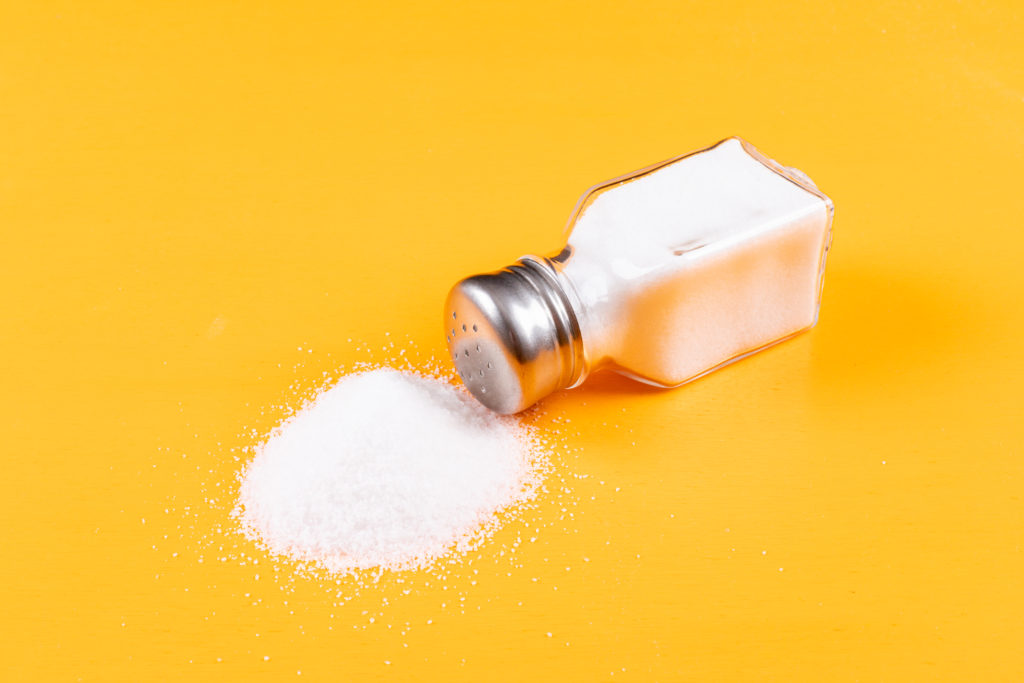Original article (in Slovenian) was published on 24/10/2022
Iodised salt does not inhibit the thyroid gland, it is the best source of iodine, which the thyroid gland needs to produce thyroid hormones, explained Katja Zaletel, the chair of the Nuclear Medicine Department at the Ljubljana University Medical Centre.
“Intake of salt with potassium iodide is harmful,” Igor Ogorevc, the founder and one of the directors of the company AS AN, which produces and sells natural cosmetics and food supplements on the website Planet Zdravja, claimed in a post on Planet Zdravja website on 12 October. Presenting himself as a professor, he added that intake of iodized salt “slowly inhibits the functioning of the thyroid gland.”
There is no public evidence that Ogorevc is a professor. The Slovenian bibliographical database Cobiss lists a work of his on food supplements, which was published in 2020 by the Slovenian Department of Alma Mater Europaea, a private college from Maribor. In a Youtube video, Ogorevc explained that his book is used as “a textbook of integrative medicine at this college and many other colleges.” He did not say which ones.
One scientific contribution by him that is available online is a summary of a lecture at the Alma Mater Europaea entitled Essential oils therapy in prevention and rehabilitation of Covid-19 infection. The summary and the conference programme describe Ogorevc as a representative of the Evolutive Neuropathy School at the Jean Monet University in Brussels.
Jean Monet University is not present in Brussels, it is based out of Lyon, France, and naturopathy is not listed among its health courses. According to publicly available information, there is no school or study program named The Evolutive Naturopathy School.
The claim that Ogorevc is a professor also appears on one of the websites of his company AS AN and on the portal Bodythermoregulation.com, where alleged experts publish allegedly scientific studies on the use of natural oils and “non-invasive blood analyzer,” and market natural oils and such an analyzer by the same company. There is no information on the website as to what kind of professor Ogorevc is supposed to be and at which institution he is supposed to work.
In his post, Ogorevc mentions Oil 80 as a replacement for iodized salt, a food supplement sold by Planet Zdravja that he claims “allows the body to offset the entire iodine deficit in a month.”
Iodisation of salt has been mandatory in Slovenia since 1953
Katja Zaletel, the chair of the Nuclear Medicine Department at the Ljubljana University Medical Centre, where they treat patients with thyroid gland conditions, told Oštro that intake of salt with potassium iodide is not harmful, it is the best way to deliver iodine, which the thyroid gland urgently needs to produce thyroid hormones.
“There is no way that ingesting iodized salt inhibits the thyroid gland,” on the contrary: the thyroid gland’s functioning slows if it does not get a sufficient amount of iodine. She warned that supplements with iodine available at pharmacies or online can cause or worsen thyroidal disease because of excessive or uncontrolled amounts of iodine.
Two members of the Slovenian Institute for Nutrition, who are respectively experts on chemistry and nutrition, carried out 2014 a study on the iodization of salt in Slovenia. In 2016 it was published in Nutrients, a peer-reviewed journal on human nutrition published online by the Multidisciplinary Digital Publishing Institute. Among 86 analyzed samples, the authors identified 42 iodized and 29 non-iodized salts, and 15 salt blends.
They explained that Slovenia introduced mandatory iodization of table salts in 1953, whereby it was determined that every kilogram of salt must contain 10 milligrams of potassium iodide.
The authors believe that the presence of non-iodized salt in the Slovenian market was made possible by Slovenia’s accession to the European Union. Prior to becoming a member, Slovenia had adopted new Rules on Table Salt Quality, which determined that rock salt and evaporated salt had to be iodized, but sea salt did not. But due to the free movement of goods and services in the EU, the rules were not notified. As a result, Slovenian authorities do not have a legal basis to restrict the sale of non-iodized salt which can be legally sold in any other EU member state.
The authors further emphasize that very little non-iodized salt is sold in Slovenia. However, the 33.7% share of non-iodized salt samples that they identified in the course of their study confirms there is a market niche that could pose a risk of inadequate iodine intake in those who consume non-iodized salt only.
The claim by Igor Ogorevc that intake of salt with added potassium iodide is harmful is false.
In a post that is not labeled as an advertisement, the author mentions Oil 80, a planet Zdravja food supplement, as a replacement for iodized salt. The post constitutes surreptitious advertising.

